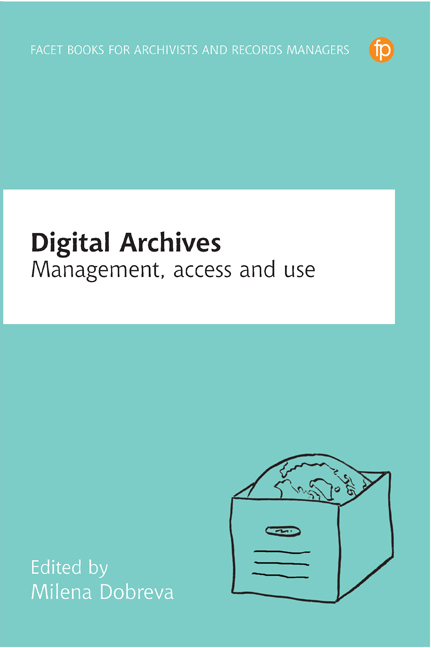Book contents
- Frontmatter
- Dedication
- Contents
- List of Figures and Tables
- Abbreviations
- Foreword
- Preface: Digital archives: management, use and access participatory approaches in archives
- Acknowledgements
- Notes on contributors
- PART I DRIVERS FOR MODERN DIGITAL ARCHIVES
- 1 Digital humanities and documentary mediations in the digital age
- 2 Managing turbulence
- 3 The political economy of digital cultural preservation
- 4 Legal issues surrounding digital archiving
- 5 Scientific information policies in the European context
- 6 Access to digital archives: studying users' expectations and behaviours
- PART II CASE STUDIES
- Afterword
- Index
1 - Digital humanities and documentary mediations in the digital age
from PART I - DRIVERS FOR MODERN DIGITAL ARCHIVES
Published online by Cambridge University Press: 02 October 2019
- Frontmatter
- Dedication
- Contents
- List of Figures and Tables
- Abbreviations
- Foreword
- Preface: Digital archives: management, use and access participatory approaches in archives
- Acknowledgements
- Notes on contributors
- PART I DRIVERS FOR MODERN DIGITAL ARCHIVES
- 1 Digital humanities and documentary mediations in the digital age
- 2 Managing turbulence
- 3 The political economy of digital cultural preservation
- 4 Legal issues surrounding digital archiving
- 5 Scientific information policies in the European context
- 6 Access to digital archives: studying users' expectations and behaviours
- PART II CASE STUDIES
- Afterword
- Index
Summary
Introduction
Some 25 years after the world wide web was born at the CERN (http://home.web.cern.ch/topics/birth-web) in Geneva in 1993, it should come as no wonder that most of the information we process today is produced and used in digital form. Capable of reproducing most of the pre-existing information carriers such as texts, pictures, sounds and films, the digital format is progressively replacing many of the former media. This process implies there will be profound changes in the daily practices of both scholars in the field of humanities and information professionals.
Understanding changes induced by the influence of digital media within professional practices remains a critical task. As Michel de Certeau reminds us, there is more to learn about the evolution of scientific disciplines through the analysis of the conditions of their production than through their scientific outputs (1975, 65). This chapter proposes to shed light on the current changes of practices within the humanities and to outline several recommendations for a closer collaboration between humanities scholars and information professionals in order to achieve a thoughtful use of digital media.
The first part of the chapter introduces the digital humanities, a field of practices situated at the crossroads between information sciences and the humanities, which has experienced a rapid growth in the past few years. It discusses the origins and scope of digital humanities, as well as the question of its definition. The close association between digital humanities and information sciences is also highlighted.
The second part shifts the focus from digital practices to professional collaborations and analyses the evolving relationship between researchers and information professionals under the influence of digital information systems. Recent changes in the use of libraries and archives are discussed, drawing from recent surveys about information practices among humanities scholars.
Finally, in the third part are recommendations on how to improve this relationship in a digital environment. It draws on previous points in order to propose some ways to introduce a closer collaboration between information professionals and humanities scholars within the context of the digital information landscape. In particular, it advocates the benefits of enhancing the visibility of documentary mediations in online environments.
- Type
- Chapter
- Information
- Digital ArchivesManagement, use and access, pp. 3 - 22Publisher: FacetPrint publication year: 2018
- 1
- Cited by

